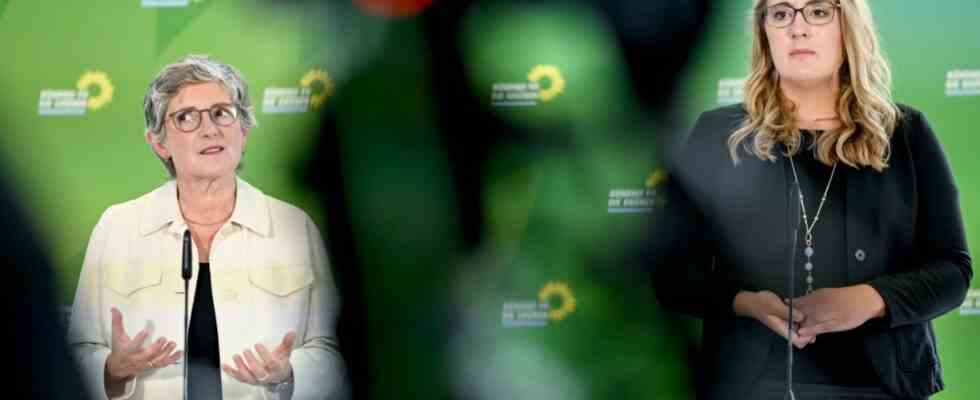The weekend should bring clarity, finally. The leaders of the governing parties want to agree on a third relief package in the coalition committee that will help private households and companies to cope with the sharp rise in energy prices. SPD parliamentary group leader Rolf Mützenich said on Thursday at the start of the SPD parliamentary group retreat in Dresden that they wanted “to have clarity before the budget week”. It starts on Monday. The Greens are also putting pressure on, wanting to agree on the relief before the Bundestag discusses the budget.
The details, however, are controversial. The factions of the SPD, Greens and FDP have put together their demands at three closed meetings this week. Now they have to come to a common denominator. It won’t be easy. Because in addition to differences in content, the rivalries are also growing. The Greens, for example, are poaching more and more often in the SPD’s territory. They no longer want to be seen as the party of higher earners, but as guarantors of justice. This is particularly evident in the struggle for the relief package. If the Greens have their way, low earners in particular should be supported, poor pensioners, students, families or the bakers’ guild plagued by high electricity prices. They also want to increase basic security – classic SPD fields.
The government must ensure “that people don’t have the feeling that they are being left alone and that worries about social decline and poverty take hold,” said Britta Haßelmann, leader of the Greens parliamentary group, after the Greens parliamentary group executive committee’s retreat in Potsdam. The meeting dealt with energy security, climate protection and the question of how the burden of the crisis can be shared fairly between industry and private households. Of course, the coalition quarrels of the last few days were also discussed: first sharp attacks by the SPD on the Green Economics Minister Habeck, then snotty replies from the Greens parliamentary group against SPD Chancellor Scholz.
At the government retreat in Meseberg, Habeck distanced himself from such manners. At the Greens retreat in Potsdam, however, nobody is said to have criticized the Scholz bashing, at least not in a large group. There is a growing willingness among some members of parliament to publicly answer cross-cuts from coalition partners. After Scholz gave the impression in Meseberg that the government was on the home straight with the relief package, an agreement should now be reached above all.
excess profit tax? The FDP did not want to hear anything about this at first
In any case, skimming off crisis-related excess profits from energy companies should come up on the table in the coalition committee. “An excess profit tax should address those companies that make excess profits without paying,” said Green Party leader Katharina Dröge on Thursday. What is meant are companies that are “not at an advantage through innovative achievements”, but “benefit from the crisis”. The SPD also wants to skim off excess profits.
The FDP didn’t want to hear anything about the idea at first. But now she seems to be moving. Finance Minister Christian Lindner has shown himself open to siphoning off “extra profits” from electricity producers, who are currently recording exorbitant profit margins simply because the price of electricity is linked to the price of gas. These are also green electricity companies that produce at the same costs as before, but benefit from the enormous electricity prices.
The Greens, who proposed the excess profit tax, still want to stick to their demand, even if green electricity providers are now affected. “We certainly don’t make politics based on which company we like or don’t like,” said parliamentary group leader Dröge. FDP parliamentary group leader Christian Dürr reiterated after the Liberal conference that excessive returns on the electricity market should be capped – but not with an excess profit tax that would affect all successful companies.
Lindner had already promised a “heavy” relief package in Meseberg; He apparently considers tens of billions of euros to be budgetary – but only in the coming year. For this year he promised a single-digit amount. The Greens, on the other hand, want relief in the double-digit billion range as early as 2022. SPD parliamentary group leader Mützenich did not want to rule out a supplementary budget.
There are differences in the basic security
In its resolution paper, the FDP parliamentary group also relies on compensating for the cold progression – which the Greens rejected until the end. “We must not forget the 48 million income taxpayers at this point,” said parliamentary group leader Dürr. The debt brake is still not available for the FDP.
Otherwise, the Liberals demand that one-time support be concentrated on those “who need it most”, including “of course” pensioners and students. The FDP parliamentary group believes that one-off payments by employers could be supported “by being exempt from tax and social security contributions”. There are differences with the Greens and SPD when it comes to basic security. The FDP wants an adjustment to inflation and better opportunities for additional income; the coalition partners are demanding a significant increase.

